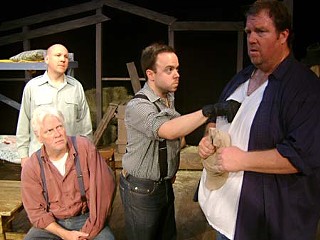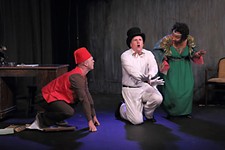Of Mice and Men
A relaxed tempo can't obscure the lyricism and dark beauty of Steinbeck's tale
Reviewed by Barry Pineo, Fri., May 27, 2011
Of Mice and Men
City Theatre, 3823-D Airport, 524-2870
Through June 5
Running time: 2 hr., 40 min.
John Steinbeck's story of George and Lennie, two migrant workers drifting through Depression-era America, is a classic American story of dreams deferred. When we meet hard-nosed George and diminutive-of-word but large-of-body Lennie, they are on the road traveling to their next job, eating canned beans heated over an open fire, sleeping under the stars. And dreaming, of course. Both are dreamers, imagining their lives after getting a stake together and buying property so they can live off the fat of the land and raise rabbits. The rabbits are for Lennie, who loves to touch soft things, so much so that he carries a dead mouse in his pocket. Lennie is not quite right in the head, and how he and George came together is not as important as the fact that they are together. George takes care of Lennie but feels saddled by Lennie's inability to remember and propensity to get into trouble.
Most of the characters in Steinbeck's play, adapted by the author from his novel, are dreamers. Old Candy, who lost his hand in an accident on the farm, dreams of being his own man as well, and he has the means to do it with the hundreds of dollars he's saved in the bank. And Curley's wife – the only female character in the play, to whom Steinbeck has not seen fit to give a name – dreams of getting away from her obsessed and overbearing husband and becoming a starlet in Hollywood. Talk about a dream – and it's without question an American one.
While Derek Jones and Andy Brown turn in honorable performances as George and Lennie, respectively, it is the supporting cast that stands out in this City Theatre Company production directed by Jonathan Urso and Andy Berkovsky. Garry Peters plays Candy, who loses more than just his hand; he's like a dog ready to be whipped at any moment by an unpredictable world. I've never seen a mule-skinner, but Daniel Sawtelle's Slim looks and behaves like he belongs on a farm handling animals, and his presentation is as cool as a drink of water on a hot day. Scot Friedman and Gabriel Diehl play two other ranch hands, Carlson and Whit, and each brings a lived-in feeling to his role, Friedman with a more mature and reasonable demeanor and Diehl with a youthful enthusiasm and desire to be liked. And Samantha Brewer brings a vivacious yearning and welcome energy to the role of Curley's wife.
The rough framework set is typical of City Theatre productions and adequately supports Steinbeck's story, as do the costumes and sound design. It is, in many ways, exactly what you would expect from a City Theatre show, but it seemed to run long. While you could find expendable material in the script, you wouldn't find a lot, and cutting material wouldn't have addressed the fairly slow tempo that Urso and Berkovsky seem to have asked the actors to maintain throughout much of the play. Granted, the story has a relaxed, dreamy feel to it, but allowing that theme to bleed into the tempo isn't necessarily the most effective choice. Fortunately, the sometimes-relaxed approach cannot obscure the lyricism and intense, dark beauty of Steinbeck's timeless tale.











